Key takeaways:
- Audio-visual heritage serves as a bridge to connect generations, preserving societal identity and personal memories.
- Building local support networks enhances community collaboration and resource sharing, vital for preserving audio-visual heritage.
- Engaging in community events fosters connections and inspires creativity, allowing individuals to share experiences and ideas.
- Networking not only leads to professional growth but also cultivates meaningful friendships that enrich personal and communal journeys.
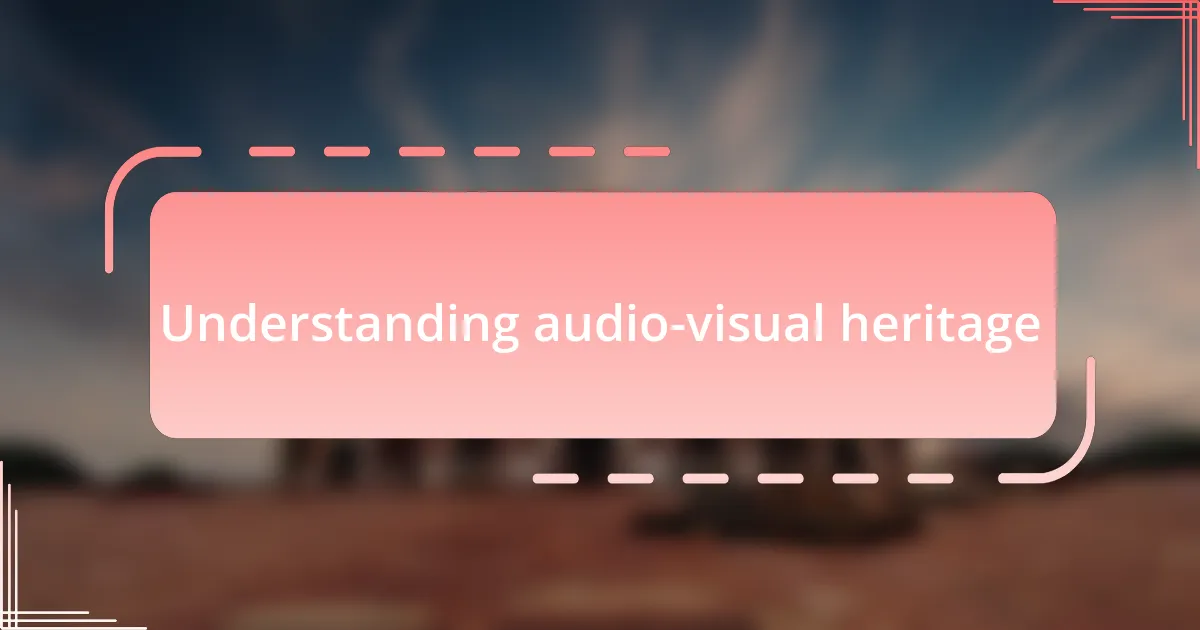
Understanding audio-visual heritage
Audio-visual heritage encompasses a wide range of materials, including films, video recordings, and audio tapes, that capture our cultural narratives. When I think about what these items represent, I am often reminded of the feeling I had while watching an old family movie. It wasn’t just the visuals; it was the sound of laughter, the voices of loved ones long gone, and the memories they evoked. Isn’t it fascinating how these artifacts can bridge generations, allowing us to connect with our past?
Understanding audio-visual heritage goes beyond merely preserving these materials; it’s about recognizing their role in shaping societal identity and memory. For instance, when I discovered a forgotten cassette tape filled with my grandmother’s stories, it hit me—this was not just a recording; it was a piece of our family’s history. How do we ensure that future generations can access these treasures? It’s a question that weighs heavily on many of us involved in heritage preservation.
The emotional weight that audio-visual heritage carries is profound. Each piece tells a story, whether it’s a documentary that captures a pivotal moment in history or a personal recording that brings back cherished memories. I recall feeling a surge of pride as I unearthed a rare local film footage from the archives that reflected my hometown’s rich cultural landscape. Such moments remind us: how can we not cherish and protect this legacy for those who come after us?
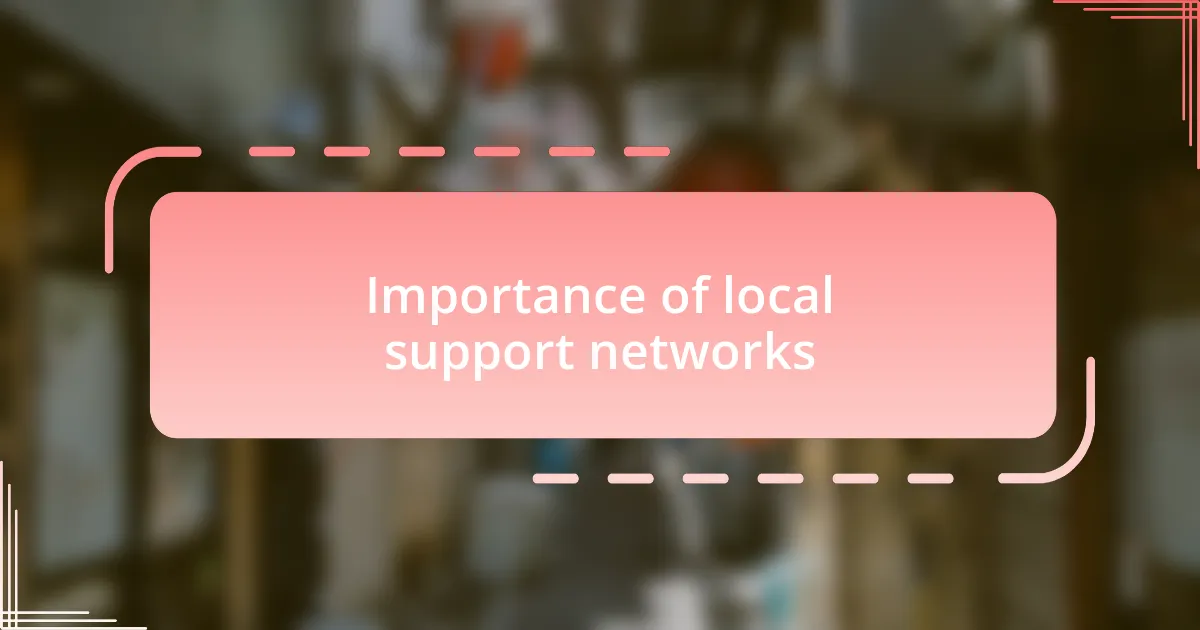
Importance of local support networks
Building a local support network for audio-visual heritage is crucial. I remember attending a community meeting where passionate individuals gathered to discuss preserving our local films. That connection sparked collaborations, inspiring volunteers to donate their time and expertise. Isn’t it amazing how sharing a common goal can energize an entire community?
Having a support network means access to diverse resources and knowledge that individuals might not have on their own. I once collaborated with a historian and a tech enthusiast at a local workshop, and their insights transformed our project. This interplay of skills brought our vision to life, highlighting how vital these connections can be in driving our collective efforts forward.
Moreover, local support networks foster a sense of belonging and purpose. I often feel uplifted when I see familiar faces at preservation events, all of us united by our passion for heritage. This camaraderie can ignite creativity and inspire new ideas; how could we thrive in isolation when the synergy of our teamwork is so powerful?
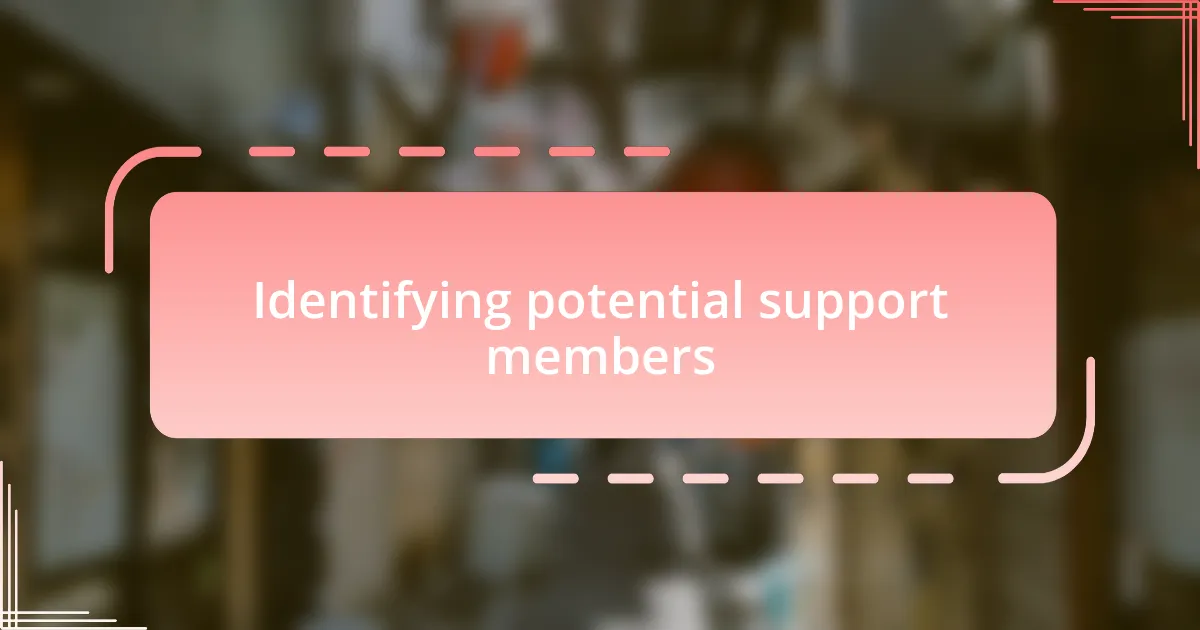
Identifying potential support members
Identifying potential support members starts with observing your community. I often find valuable allies by attending local events, like film screenings or workshops, where enthusiasts gather. At one particular film festival, I met a graphic designer who had a passion for storytelling through visuals. It was fascinating to see how easily we connected over our shared interests, sparking ideas that could enhance our projects.
Another effective method is leveraging social media platforms. When I shared a post about my audio-visual heritage initiative, I was pleasantly surprised by the number of people who reached out with offers to collaborate or share their expertise. This digital outreach not only identified potential members but also expanded my network beyond the local community, opening doors I never anticipated. Isn’t it intriguing how technology can bridge gaps and create a supportive environment?
Don’t overlook the value of personal recommendations, either. I once reached out to a friend who had another connection in the preservation field. That conversation led me to a retired film archivist who had a wealth of knowledge and stories to share. Personal ties often yield the most dedicated supporters, as they come with trust and a shared interest in the cause. Have you ever considered where your existing relationships might lead you in this journey?
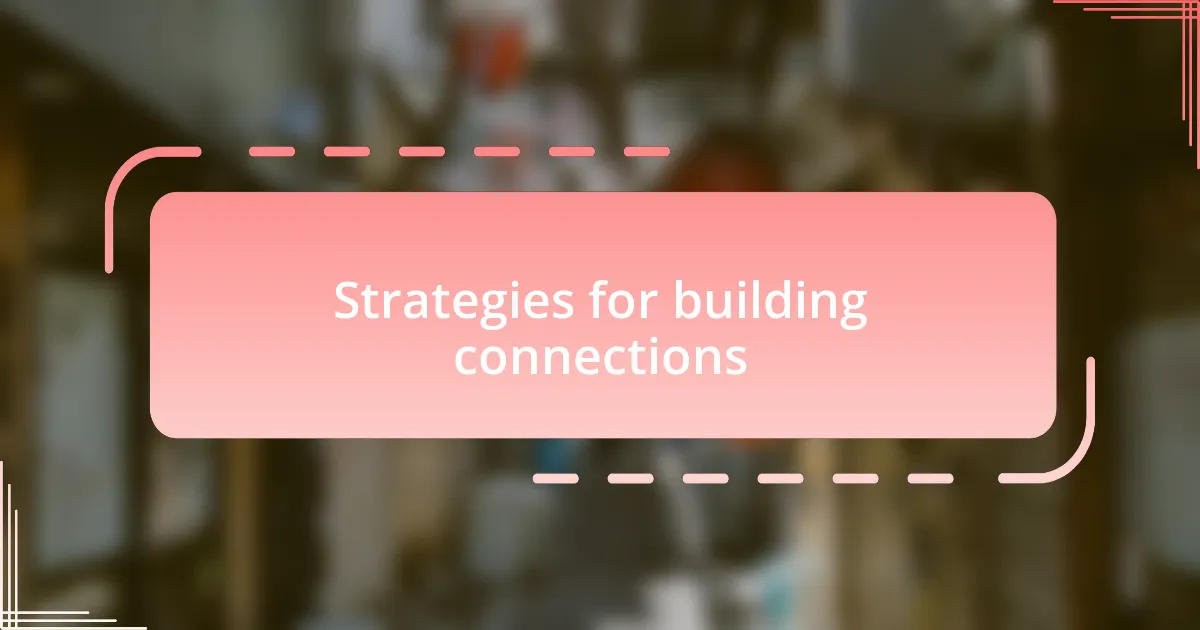
Strategies for building connections
Building connections often starts with a proactive approach. I remember attending a local gallery opening where I struck up a conversation with an audio engineer. As we shared our experiences, I realized our collaboration could elevate both of our projects. There’s something powerful about letting curiosity guide your interactions—were it not for that spontaneous conversation, I might have missed out on a wonderful partnership.
Another strategy that has proven effective in my journey is joining or forming local interest groups. For instance, I initiated a small meet-up for enthusiasts of audio-visual heritage, where we could share insights and resources. The first meeting felt daunting, but the energy in the room was electric. I could see how eager everyone was to find their niche and contribute. It was that sense of community that propelled us all forward—have you thought about the potential of creating a space for shared passion in your area?
Lastly, volunteering for community projects can be an unexpected yet impactful strategy. I once offered my skills to help with a local documentary about historical landmarks. Not only did I connect with committed individuals, but I also gained insights into the local storytelling approach. It reaffirmed my belief that engaging in hands-on projects can illuminate shared goals and foster deeper relationships. Have you explored how giving back could enhance your own network?
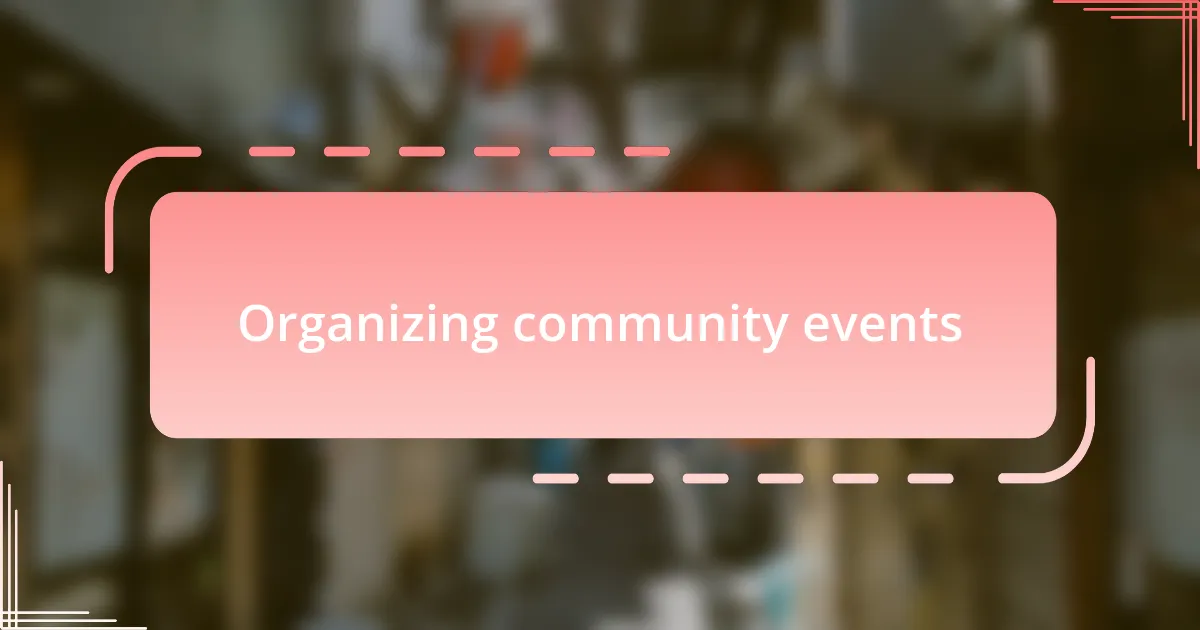
Organizing community events
Organizing community events can be transformative for building connections. Once, I decided to host a small film screening featuring local documentaries. The excitement in the air was palpable as attendees engaged not just with the films but also with one another in discussions that flowed naturally. Witnessing strangers become friends over shared narratives made me realize how powerful a simple event can be in creating lasting bonds.
One memorable experience I had was coordinating a panel discussion with industry experts. The night was filled with laughter, thoughtful questions, and even impromptu storytelling from the audience. I found that fostering an open environment encouraged people to share their own stories, deepening our connection to one another. Have you considered how your events might inspire spontaneous conversations?
Moreover, the planning process itself can be a rewarding opportunity for collaboration. I recall partnering with a local music venue to host a multimedia showcase that blended audio-visual art with live performances. The collaborative effort not only brought a diverse group together but also highlighted the unique talents within our community. Have you thought about the potential cross-pollination of ideas that could occur through joint ventures like these?
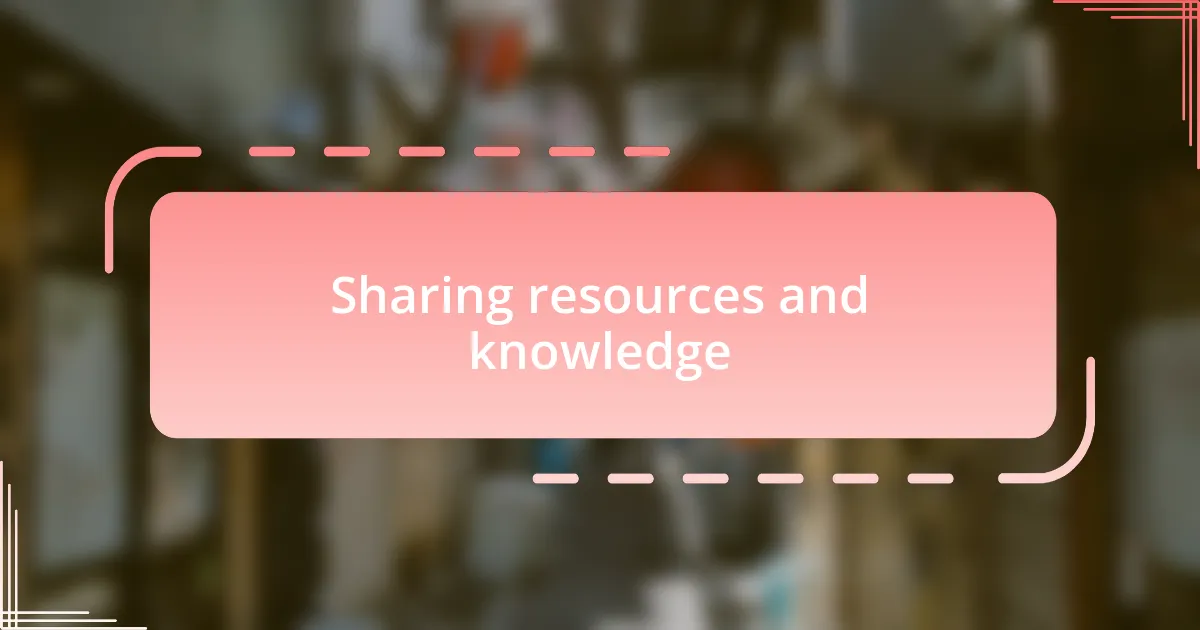
Sharing resources and knowledge
Sharing resources and knowledge has always been a cornerstone of building community connections. I once initiated a digital resource-sharing platform where members could exchange materials related to audio-visual heritage. The joy was evident in people’s messages as they discovered new archives and tools that they had previously overlooked. Have you thought about how much learning can accelerate when we open up our treasure troves of information to one another?
Just last year, I led a workshop focused on the preservation techniques for historical films. Participants brought their own stories and challenges, and it became a collaborative learning experience. The moment I saw someone apply a method we discussed right there in the workshop was incredibly fulfilling. It really hit me then—by sharing knowledge, we not only educate but also empower one another to take action. Isn’t it inspiring to think of the ripple effects created by a single shared insight?
As I reflect on my journey, what stands out most is the sense of belonging that comes from shared learning. I remember a particularly intimate session where a group of us exchanged tips on archiving sound recordings. The vulnerable stories behind each individual’s collection turned a simple discussion into an emotional connection. It made me realize that sharing isn’t just about resources; it’s about nurturing a collective identity and inspiring a passion that fuels our efforts. How has sharing knowledge shaped your own experiences within your community?
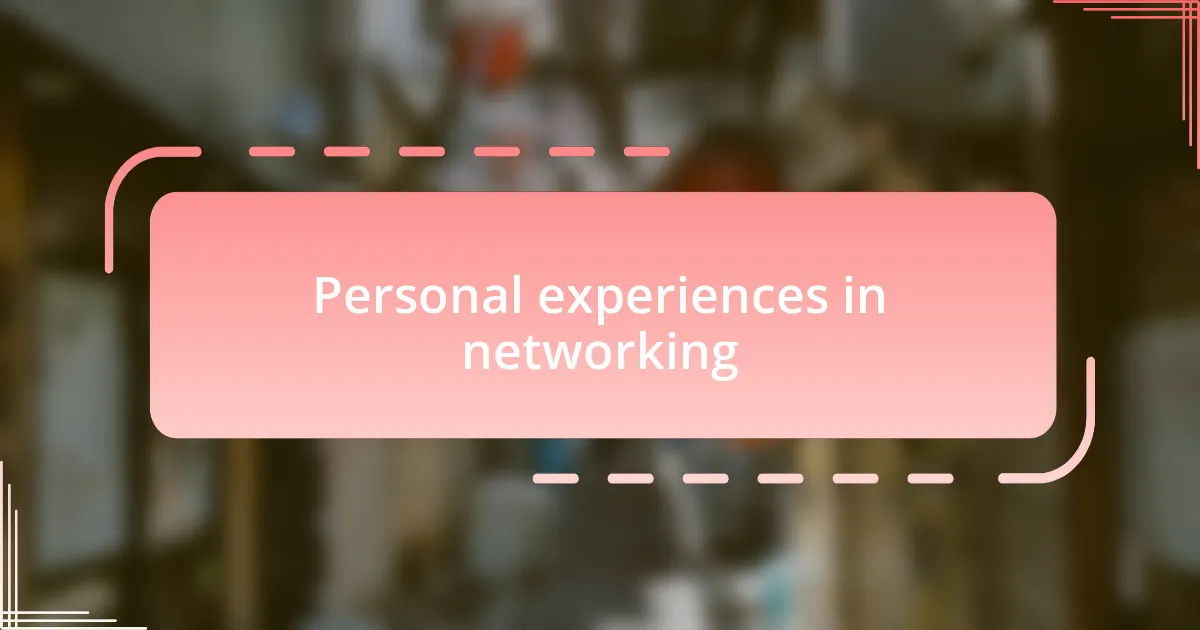
Personal experiences in networking
Networking has been a transformative experience for me, especially in the realm of audio-visual heritage. I vividly remember attending a local conference where I was unsure if I would even belong. However, I took a leap of faith and approached a small group discussing a project on digitizing archival footage. Their warm welcome and shared enthusiasm ignited a spark within me, turning a moment of hesitation into a wonderful connection. Have you ever felt that rush of belonging when you find your people?
Another memorable experience was a casual meet-up I organized at a local café. I invited colleagues and acquaintances to bring their latest projects. To my surprise, the discussions evolved into lively brainstorming sessions. I witnessed how diverse perspectives can yield innovative solutions. It made me think—how often do we miss out on collaboration simply because we don’t reach out?
Reflecting on these moments, I realize that networking isn’t just about professional gain; it’s about the friendships formed along the way. I recall staying up late with new friends, sharing stories and dreams over coffee, and how those connections transformed not just our work, but also our personal lives. Have these kinds of friendships influenced your own journey in unexpected ways?